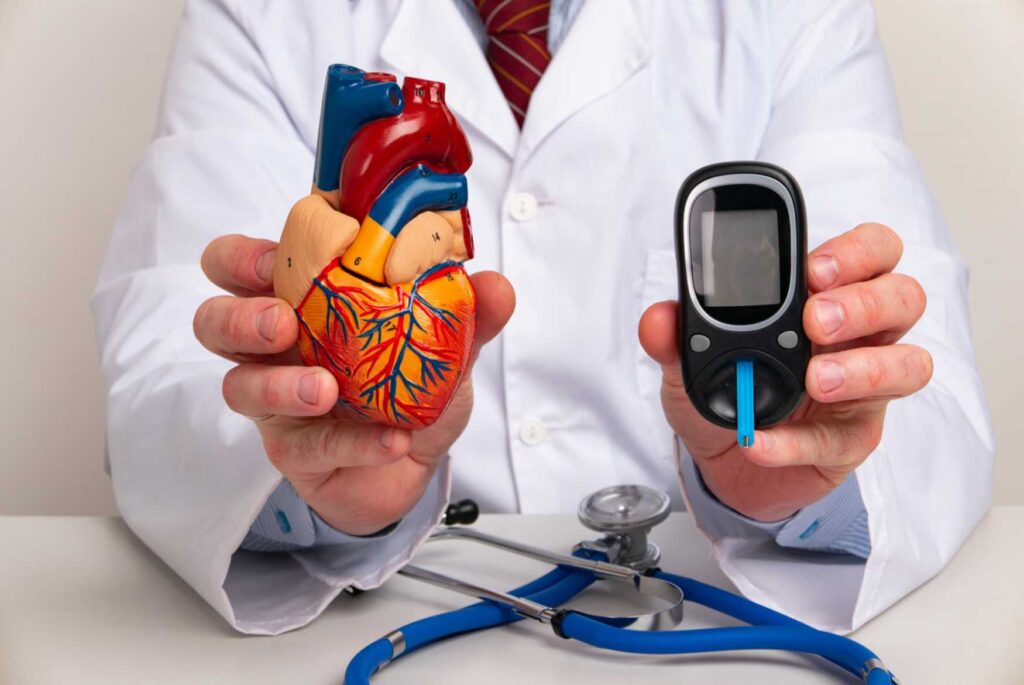Exploring the Link Between Diabetes and Heart Disease
There is a complex relationship between diabetes and heart disease. Both conditions are increasingly common and often occur together, making it essential to understand how one affects the other. Complete Cardiology Care in Sugar Land, Texas, wants to help patients explore the connection between these two chronic conditions to make informed decisions to protect their long-term health.

The Relationship Between Diabetes and Heart Disease
The connection between diabetes and heart disease is well-established. People with diabetes are two to four times more likely to develop cardiovascular issues than those without the condition. This elevated risk is largely due to the effects of high blood glucose levels over time.
Why Diabetes Raises Heart Disease Risk
Consistently elevated blood sugar can damage the inner lining of blood vessels, making them more prone to atherosclerosis—a buildup of fatty deposits that narrows and hardens the arteries. In addition, high glucose can impair the nerves that help regulate heart function, increasing the likelihood of complications such as heart attacks, strokes, and heart failure. Other common factors in diabetes, like high blood pressure, abnormal cholesterol levels, and inflammation, also contribute to increased cardiovascular risk.
The Diabetes and Heart Disease Connection
Diabetes is closely associated with a range of heart-related conditions, each carrying serious health implications:
- Coronary Artery Disease – Coronary artery disease occurs when high blood sugar levels damage the blood vessels, leading to plaque buildup that narrows or blocks the coronary arteries. This can reduce blood flow to the heart and increase the risk of heart attacks.
- Heart Failure – Heart failure is more likely in people with diabetes due to the strain high glucose levels place on the heart over time. The heart muscle may weaken or stiffen, making it harder for the heart to pump blood efficiently throughout the body.
- Stroke – Stroke risk is significantly higher in individuals with diabetes, as elevated blood sugar can contribute to the formation of blood clots and damage to blood vessels in the brain. A stroke occurs when blood flow to part of the brain is interrupted, leading to potential brain damage or loss of function.
- Peripheral Artery Disease (PAD) – Peripheral artery disease is a common complication in people with diabetes, involving reduced blood flow to the limbs due to narrowed arteries. PAD can cause pain and numbness and increase the risk of infection or amputation if left untreated.
Risk Factors of Heart Disease and Diabetes
Several factors can heighten the risk of heart disease and diabetes complications. Patients should be especially cautious if they have:
- High blood pressure
- Elevated cholesterol levels
- Smoking habits
- Obesity or physical inactivity
Prevention & Management Strategies
Managing both diabetes and heart disease starts with a strong foundation of healthy lifestyle choices. The best diet for heart disease and diabetes includes whole grains, lean proteins like fish or poultry, plenty of fresh vegetables, and foods that are low in added sugars and sodium. Portion control and mindful eating also play a role in maintaining stable blood glucose and cholesterol levels. Regular physical activity, such as walking, swimming, or cycling, helps improve insulin sensitivity, strengthen the heart, and manage weight. Just as important is taking prescribed medications as directed, whether for blood sugar control, blood pressure, or cholesterol.
Screening & Diagnostic Tools
Early detection plays a critical role in reducing the impact of these conditions. Tools such as EKGs, blood pressure monitoring, lipid panels, and glucose tests help identify risks early. Complete Cardiology Care provides advanced screening options to support cardiac wellness.
Schedule an Appointment With Complete Cardiology Care
Understanding the symptoms of diabetes and heart disease can help you act early and reduce complications. If you or a loved one are concerned about the link between diabetes and heart disease, contact Complete Cardiology Care in Sugar Land, Texas. Call our office or fill out our contact form to schedule an appointment.


